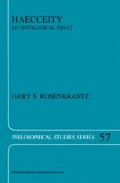Abstract
In the preceding chapter, I argued that there are unexemplified nonqualitative haecceities which individuate nonexistent possible concreta, including both nonexistent possible concreta which are mereologically and causally disjoint, and nonexistent possible concreta which are mereological or causal products.1 As noted earlier, this line of reasoning implies that Strong Extreme Realism is true. Since bifurcated and moderate realist objections to my argument were also answered in that chapter,2 there seems to be no barrier remaining to the acceptance of Strong Extreme Realism. Accordingly, in the arguments to follow I assume that Strong Extreme Realism is true, and hence that no form of Moderate Realism is correct.
“The conversion...of these innate potentialities into actual existences.”
[from Huxley Hume iii. 85 (1879)]
“What is and will be latent is little better than nonexistent.”
[Sir T. Browne Christian Morals 75 (1716)]
“Particularize a few drops of the sea, by filling a glasse full of them; then that glasse-full is distinguished from all the rest of the watery Bulke.”
[1643 Digby Observations upon Religio Medici 84 (1644)]
“Let but a sharp cold come, and they unite, they consolidate, these little atoms cohere.”
(1690 Locke An Essay Concerning Human Understanding II. xxiii. § 26)
Access this chapter
Tax calculation will be finalised at checkout
Purchases are for personal use only
Preview
Unable to display preview. Download preview PDF.
References
Elsewhere I have argued that mereological and causal descriptions such as Da, Db,and Dc make a kind of singular reference to nonexistent possible concreta,viz., certain mereological and causal products. In contrast, my current argument is not that there is a kind of singular reference to nonentities of a certain sort, but rather that some singular terms denote unexemplified nonqualitative haecceities - which are abstract entities. See Gary Rosenkrantz, “Nonexistent Possibles and Their Individuation,” Grazer Philosophische Studien,22 (1984), pp. 127–147; and “Reference, Intentionality, and Nonexistent Entities,” Philosophical Studies,58 (1990), pp. 163–171. Compare Roderick Chisholm “Monads, Nonexistent Individuals, and Possible Worlds: Reply to Rosenkrantz,” Philosophical Studies,58 (1990), pp. 173–175; and Gary Rosenkrantz, “On Objects Totally Out of This World,” Grazer Philosophische Studien,25/26 (1985/1986), pp. 197–208.
Author information
Authors and Affiliations
Rights and permissions
Copyright information
© 1993 Springer Science+Business Media Dordrecht
About this chapter
Cite this chapter
Rosenkrantz, G.S. (1993). Singular Reference and Unexemplified Haecceities. In: Haecceity. Philosophical Studies Series, vol 57. Springer, Dordrecht. https://doi.org/10.1007/978-94-015-8175-2_4
Download citation
DOI: https://doi.org/10.1007/978-94-015-8175-2_4
Publisher Name: Springer, Dordrecht
Print ISBN: 978-90-481-4311-5
Online ISBN: 978-94-015-8175-2
eBook Packages: Springer Book Archive

